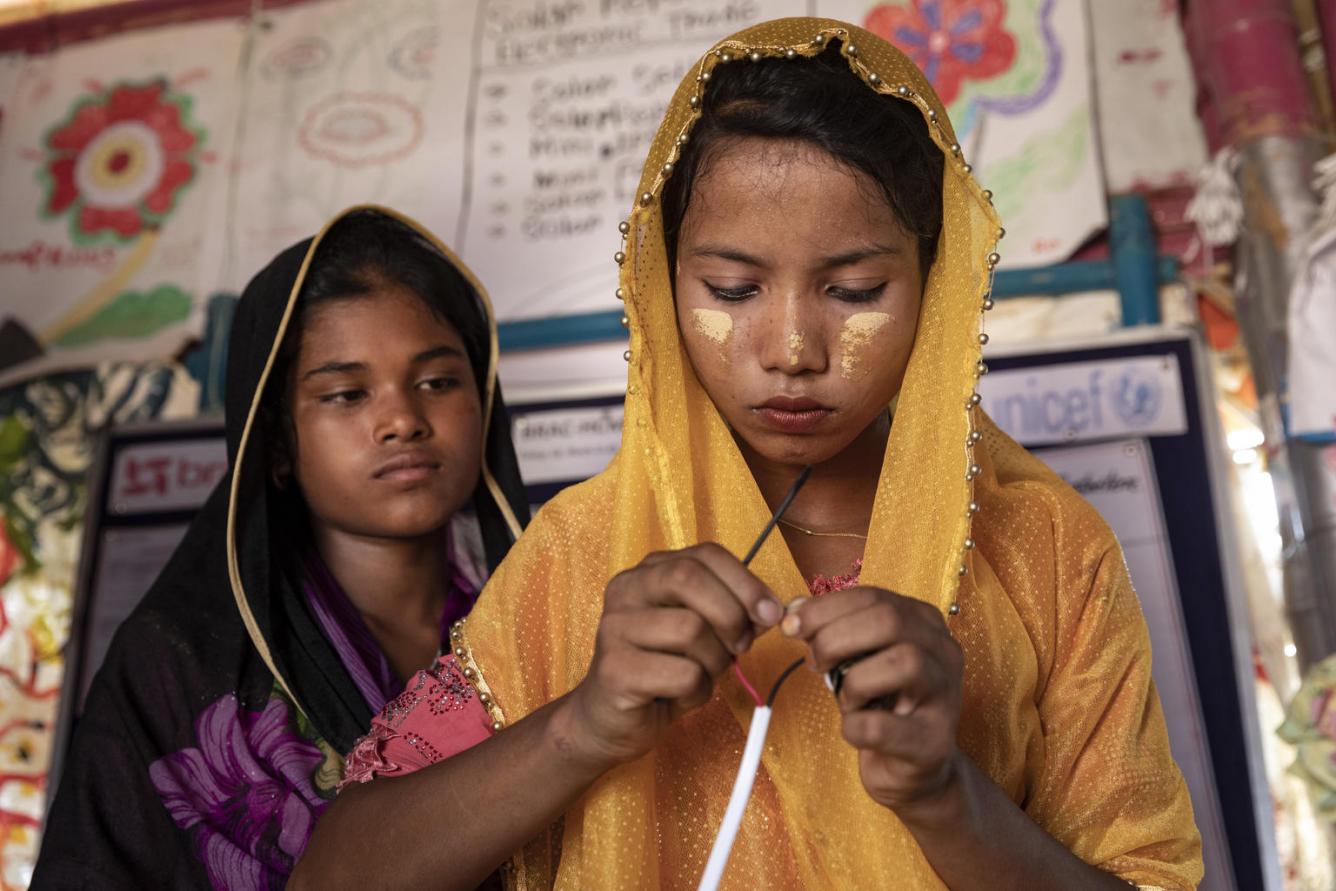Beyond survival: The need for education for Rohingya refugees
For the last two years, the sole focus of the more than 900,000 Rohingya refugees living in the camps of southeast Bangladesh has been on staying alive. New infrastructure and efforts aimed at providing the basics of health care, nutrition, and water, sanitation and hygiene, have improved conditions for the children and families who fled persecution and violence in Myanmar. But as the refugee crisis drags on, children and young people are clamoring for more than survival: they want quality education.
UNICEF’s new report is calling for urgent investment in education and skills development opportunities in and around the vast camps where most of the refugees live.
help fund education for rohingya children.

Rohingya children want a better future
When the influx of refugees from Myanmar to Bangladesh began in 2017, UNICEF and partners responded by setting up Learning Centres in the camps. By June 2019, the overall education sector had provided non-formal education to 280,000 children aged 4 to 14, but about 640 additional Learning Centres are still needed, mainly in the more densely populated camps.
An estimated 97%of Rohingya youth – aged 15 to 18 years old – in the camps, are not enrolled in any type of learning facility. Parents are concerned that the longer their children are deprived of education, the greater the risk that they will be exposed to exploitation and abuse.
The sense of frustration among the teenage boys who can be found hanging around on the paths and walkways of the camps most days is unmistakable. Without school or skills training, there is little for them to do each day, an unfortunate fact which has begun to effect even the younger Rohingya youth.
Education for girls lags even further behind. In most cases, when girls reach puberty, they are withdrawn from school by their families – expected to stay at home and assist with looking after the makeshift shelters, fetching water and caring for younger siblings and family members.
UNICEF and partners have developed around 100 Adolescent Clubs and established a network of youth centres that offer psychosocial support and classes in literacy, numeracy, life skills and vocational skills. The centres are part of a broader UNICEF strategy to expand access to integrated health, protection, learning and other services for an estimated 123,000 adolescents between age 12 and 18.
“Our aim is to help equip adolescents with the skills they need to deal with many risks they encounter, such as trafficking, abuse, and – in the case of girls – child marriage,” UNICEF Bangladesh Representative, Tomoo Hozumi
Providing youth with learning opportunities
Shahed (13) and his family fled Myanmar in 2017. Since then they have lived in a refugee camp in Cox's Bazaar Bangladesh. He is enrolled in a UNICEF supported training centre where he learns abotu basic electronics. Despite enjoying his training, Shahed is fearful that the loss of his 'high class' education will negatively impact his future possibilities.

Nur (right), 16, prepares her tools while attending a workshop on installing and repairing solar panels that are ubiquitous in Cox's Bazar, Bangladesh. “I’m learning this so that I can do repairs myself in my house," Nur says. "The boys can come here, so why not the girls?"
UNICEF has partnered with Bangladeshi NGO BRAC to provide essential skills training to young people between the ages of 15 and 24 in the camps and the surrounding communities. Empowered and equipped with the job skills they acquire in the UNICEF-supported training program, these young people will be better able to provide for themselves and their families.

Yasmin (left), 12, a Bangladeshi national, and Showkat (right), 15, a Rohingya refugee, both attend a UNICEF-supported adolescent club in Lambasia refugee camp, Cox's Bazar, Bangladesh. The club brings together children from both refugee and host community populations to discuss issues that are common to them all, such as early marriage, relationships with boys, and also dangers such as drugs and trafficking.
Two years on, day-to-day needs of the Rohingya is ongoing
Two years after hundreds of thousands of Rohingya refugees started arriving in the Cox’s Bazar district of southeastern Bangladesh, the need for services remains dire. Still substantial gaps exist in health, nutrition, child protection and water, sanitation and hygiene services. Amid all these pressing needs, one above all others has become a clarion call for action: quality education and skills development.
